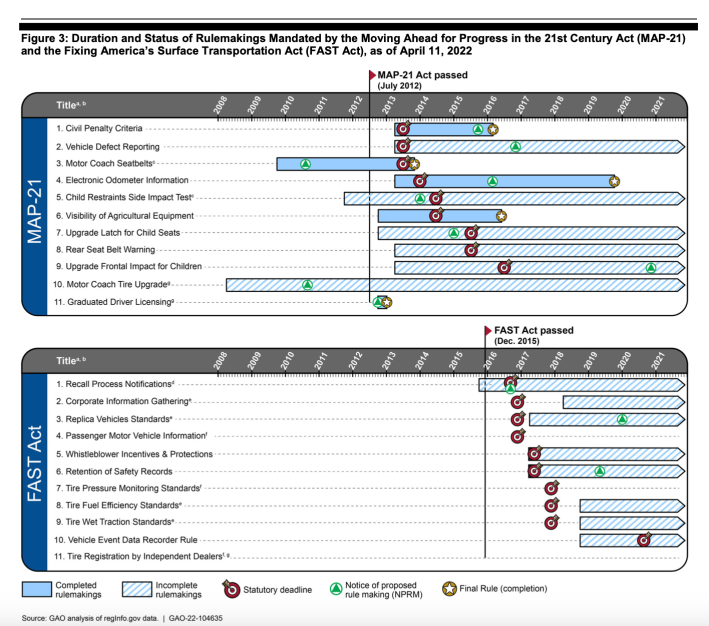The Bipartisan Infrastructure Law has been in effect for a full year, but federal transportation officials still haven't implemented some of its most crucial safety provisions — and advocates and electeds say its time they step up to stem the record-setting tide of traffic deaths on U.S. roads.
On Tuesday, a coalition of 10 Democratic Senators led by Ed Markey (D-Mass.) and Richard Blumenthal (D-Conn.) demanded that National Highway Traffic Safety Administration issue a progress report on a slate of congressionally mandated safety provisions outlined in the transportation bill, including more than a dozen common-sense vehicle safety regulations to combat drunk driving, motorist distraction, and more.
The deadlines for some of those rules, though, are looming, while others have already lapsed, even as road deaths climbed to a 16-year high — and lawmakers want the agency to act with more urgency.
“For too long, NHTSA took its foot off the gas," the authors of the letter wrote. "By passing a historic, bipartisan infrastructure law, Congress gave NHTSA the green light to put its pedal to the metal to reduce motor vehicle fatalities."
A representative for the agency said that NHTSA had "received the letter led by Sen. Markey and Sen. Blumenthal and is in the process of drafting a response."
The senators did point out that NHTSA hasn't blown all of its deadlines — even if the changes they've made may not be as ambitious as advocates would like.
In March 2022, for instance, the agency issued an request for comments on a proposed update to the New Car Assessment Program that would, for the first time, provide car-shoppers with information about how likely their vehicles are to kill a pedestrian in the event of a crash. That proposal actually came months ahead of schedule — though unfortunately, it focused mostly on recommending still-imperfect automated vehicle technologies, rather than discouraging consumers from buying the SUVs and pick-ups whose sheer size experts say is a driving factor behind the pedestrian death crisis.
Advocates worry that other forthcoming rules will miss the mark, too — or that automakers will be allowed to drag their feet on actually implementing them. Some areas of concern include, but are not limited to:
- Establishing strong performance standards for automatic crash avoidance technologies, which sounds great... except that tech to avoid crashes specifically with pedestrians, bicyclists and other vulnerable road users aren't required, and there's no "date certain" for carmakers to even comply with the law.
- A new requirement that all passenger cars come equipped with impaired driving prevention technology — but if NHTSA can't finalize the rule in a whopping ten years, regulators will be allowed to just write a report to Congress explaining why and let it drop.
- A new rule that would mandate all new vehicles under 10,000 pounds to come with an alert system to remind drivers to check the back seat every time they park, which could prevent dozens of children from dying after being forgotten in hot cars each year — but doesn't require technology to actually sense that a kid is in danger, which means caregivers are likely to tune out the alarm.
- A required report on the efficacy of distracted driver monitoring systems — though NHTSA may not actually require automakers to use those systems, however well they work, because Congress didn't ask them to.
- A new law that would require rear underguards to prevent vehicles and people from being swept under the wheels of a large truck in a crash — but doesn't require side underside guards, which can prevent up to 74 percent of cyclist deaths in certain common crash scenarios.

Even if many of the vehicle safety provisions in the Bipartisan Infrastructure Law aren't perfect, though, advocates say that getting them completed on or ahead of schedule is the first step towards more significant reforms — though based on its track record, they're not optimistic that the agency will act with enough urgency, either.
According to a recent report from the Government Accountability Office, by April 2022, NHTSA had completed just six of the 22 rule makings required by the last two major transportation bills, which analysts chalked up to poor project schedule management. Those laws included several seemingly simple and uncontroversial provisions for which advocates have been fighting for years, like upgrading latches on child seats.
When the agency blows its congressionally mandated deadlines, it's generally required to release a report explaining why — but it still hasn't written one detailing how it fell so far behind on the safety measures in the last two laws. And until NHTSA catches up with the backlog, advocates say people are needlessly dying.
"A particular tragedy of the upward spiral of motor vehicle deaths is that significant reductions are achievable but have not been accomplished," said Cathy Chase, president of the Advocates for Highway and Auto Safety, in a release. "Last year, our neighborhood streets and our nation’s roadways were killing fields, with over 115 people dying and thousands more injured in motor vehicle crashes every day of the year. ... It is time to move beyond applauding the IIJA and to focus on completing crucial rulemakings to realize the proven safety benefits."






